#ABM Marketing Automation
Explore tagged Tumblr posts
Text
Elevating Communication with AI Voice Bot Technology
Imagine a world where businesses can have natural, intelligent conversations with their customers through technology. That’s exactly what an AI voice bot offers. Unlike traditional bots, these advanced systems understand context and respond with meaningful answers, making interactions smoother and more personal.
At VoiceOwl.ai, we’re dedicated to building AI voice bot solutions that fit seamlessly into your existing setup, helping automate customer service and make every interaction count.Our AI voice bots are designed to learn and improve over time, ensuring they keep up with your needs and provide the best possible responses.
Whether you need help with customer support, virtual assistants, or smart home devices, VoiceOwl.ai is here to bring the future of communication to your business.
#Lead verification automation#Lead Qualification automation#BFSI Automation#NBFC Automation#ABM Marketing Automation#Call Center Automation#Conversational AI#RCM Automation#E-commerce Automation#Logistics Automation#Recruitment Automation
0 notes
Text
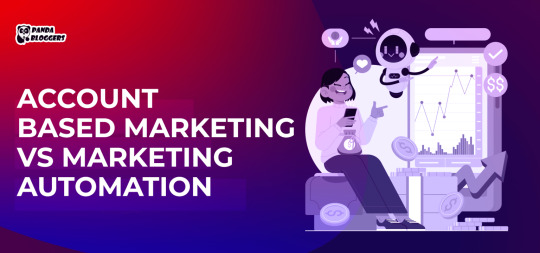
ABM vs Marketing Automation: A Comparative Guide
In our latest guide, "ABM vs Marketing Automation: A Comparative Guide," we explore the key differences between Account-Based Marketing (ABM) and marketing automation strategies. By understanding their unique strengths and how they can complement each other, we at Panda Bloggers help you choose the best approach for your business needs. Dive in to enhance your marketing strategy today!
0 notes
Text
Mastering B2B Sales: Your Essential Guide to 20 Proven Strategies and Tactics for 2025

The B2B sales landscape is transforming rapidly, driven by advancements in technology, changing buyer behavior, and heightened competition. As businesses gear up for 2025, the focus must shift to a more strategic, data-driven, and customer-centric approach to achieve sustainable growth. Below, we delve into 20 essential strategies and tactics that every B2B company should adopt to refine their sales processes and thrive in the ever-evolving market.
1. Personalized Customer Engagement
In today’s competitive environment, personalization is no longer optional—it’s essential. Tailor your messaging to address specific customer pain points and needs. Use CRM platforms to track interactions, preferences, and behavioral data, ensuring every touchpoint feels meaningful and relevant.
2. Adopt AI and Automation
Artificial intelligence and automation tools are transforming how B2B sales teams operate. From chatbots handling initial inquiries to AI-driven analytics predicting customer needs, these technologies streamline workflows, improve efficiency, and help prioritize leads for better conversion rates.
3. Focus on B2B Lead Generation in India
With India’s growing economy and increasing demand for B2B services, it’s a hotspot for lead generation. Companies like The Global Associates specialize in capturing high-quality leads in this region, enabling businesses to tap into one of the world’s fastest-growing markets. Invest in localized marketing campaigns, and utilize platforms like LinkedIn and Google Ads to target decision-makers effectively.
4. Implement Account-Based Marketing (ABM)
ABM is a powerful strategy where marketing and sales teams work collaboratively to target high-value accounts. Instead of casting a wide net, focus your resources on a select group of prospects, delivering customized campaigns that directly address their specific needs.

5. Enhance Your Digital Presence
Your online presence is often the first impression potential clients have of your business. Ensure your website is optimized for SEO, mobile-friendly, and offers a seamless user experience. Regularly update blogs, whitepapers, and case studies that demonstrate your expertise and add value to your audience.
6. Develop Multi-Channel Outreach
Gone are the days when email alone could drive sales. Today’s B2B buyers expect communication across multiple channels, including email, phone, social media, and even in-person meetings. A well-coordinated outreach strategy ensures you’re reaching prospects wherever they are most active.
7. Invest in Value-Driven Content
Content is the backbone of B2B marketing. Create in-depth whitepapers, blogs, videos, and case studies that address the challenges your prospects face. Use content as a tool to educate and build trust, positioning your business as a thought leader in your industry.
8. Strengthen Sales Enablement
Empower your sales team with the tools, resources, and training they need to succeed. This includes access to up-to-date product information, buyer personas, and data-driven insights that can help them tailor their pitch to individual prospects.
9. Leverage Data Analytics
Incorporate data-driven insights into every stage of your sales funnel. Use analytics tools to track customer behavior, identify trends, and refine your strategies. This approach ensures you’re always making informed decisions that drive results.
10. Collaborate with Strategic Partners
Partnering with complementary businesses can open doors to new opportunities. For instance, a software provider could partner with a consulting firm to offer bundled services, creating value for both companies and their customers.
11. Focus on Customer Retention
It’s often said that retaining a customer is more cost-effective than acquiring a new one. Implement loyalty programs, provide excellent post-sale support, and continuously engage with your existing customers to ensure they remain loyal advocates for your brand.
12. Harness the Power of Video Marketing
Video content is increasingly becoming a preferred medium for B2B buyers. Use explainer videos, product demos, and client testimonials to engage prospects and communicate your value proposition effectively.
13. Encourage Referrals
Happy customers can become your best brand ambassadors. Develop a referral program that incentivizes your existing clients to recommend your services to their network.
14. Monitor Competitors
Keeping a close eye on your competitors can provide valuable insights. Identify what’s working for them and where they might be falling short. Use this information to refine your strategies and gain a competitive edge.

15. Expand Internationally
If your business hasn’t explored international markets yet, 2025 might be the year to do so. Develop localized strategies to address the specific needs and cultural preferences of global audiences.
16. Use Social Proof to Build Credibility
Social proof, such as client testimonials, success stories, and case studies, plays a crucial role in establishing trust. Showcase these prominently on your website and marketing materials to demonstrate your capabilities.
17. Align Sales and Marketing Teams
Silos between sales and marketing teams can hinder your growth. Align their goals and encourage collaboration to create a seamless journey from lead generation to conversion.
18. Host Webinars and Events
Webinars and events are excellent ways to educate your audience, showcase your expertise, and generate new leads. Offer valuable insights during these sessions to leave a lasting impression on your prospects.
19. Optimize Pricing Strategies
Your pricing strategy should cater to different customer segments. Offer tiered packages, volume discounts, or subscription models to accommodate varying budgets and requirements.
20. Partner with Industry Experts
Collaborate with B2B sales and lead generation experts like The Global Associates. With a proven track record of delivering high-quality leads and helping businesses achieve their sales goals, partnering with such firms ensures your strategy is backed by experience and expertise.
Final Thoughts
The future of B2B sales lies in leveraging technology, focusing on customer-centric strategies, and optimizing lead generation efforts in emerging markets like India. By adopting these 20 essential tactics, businesses can stay ahead of the curve, driving both growth and profitability in 2025.
Would you like a tailored approach to integrate these strategies into your business? Collaborate with The Global Associates to unlock the full potential of your B2B sales strategy.
#b2b#b2b lead generation#lead generation#the global associates#b2b lead generation services#lead generation services in india
3 notes
·
View notes
Text
Optimizing B2B Contact Databases: Strategies for Better Targeting
Article by Jonathan Bomser | CEO | AccountSend.com
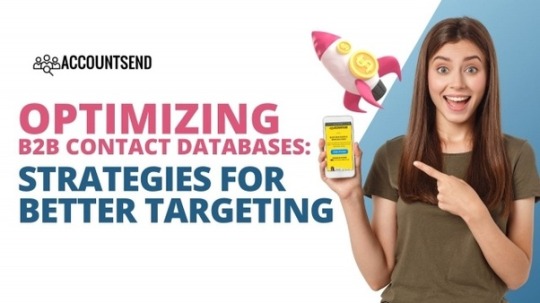
As a B2B business, your contact database is one of the most valuable assets you have. It enables targeted sales outreach, precision marketing, and effective lead generation, thus driving sales and growth. In this article, we will explore seven key strategies for enhancing your B2B contact database for superior targeting. By implementing these strategies, you can significantly enhance your targeting, boost conversions, and drive business growth.
DOWNLOAD THE B2B CONTACT DATABASES INFOGRAPHIC HERE
Regularly Cleanse and Update Your Database
A clean and updated B2B contact database is essential for effective sales prospecting and business development. Regularly purge outdated information, remove duplicates, and update existing contact data to maintain accuracy. CRM integration can automate this process, ensuring your database remains current and reliable. By keeping your database clean and up-to-date, you can ensure that your sales and marketing efforts are based on accurate and relevant information.
Segment Your Contact Database
Segmentation is a powerful tool for B2B lead generation and sales prospecting. It involves categorizing your database into distinct groups based on shared characteristics, such as industry type, company size, or role. This facilitates personalized communication, enhancing engagement and conversion rates. By segmenting your contact database, you can tailor your messaging and content to specific audience segments, increasing the relevance and effectiveness of your communication.
Implement a Lead Scoring System
Lead scoring is a crucial aspect of B2B lead generation and sales funnel optimization. It assigns value to each contact based on their potential to convert into a customer. It helps prioritize your outreach, ensuring you focus on high-value leads, which can lead to improved sales opportunities. By implementing a lead scoring system, you can allocate your resources effectively and focus on the leads that are most likely to result in conversions.
Embrace Account-Based Marketing (ABM)
Account-Based Marketing (ABM) is a highly effective B2B marketing strategy that targets specific high-value accounts with customized campaigns. Integrating ABM with your B2B contact database ensures a highly tailored approach, enhancing your chances of winning over key accounts. By aligning your marketing and sales efforts with the specific needs and preferences of target accounts, you can increase engagement and drive business growth.
youtube
Leverage Data Analysis
Data analysis is a powerful tool for B2B lead generation and sales prospecting. It helps you uncover invaluable insights into your contacts' behavior and preferences, guiding your marketing and sales strategy. By analyzing data from your B2B contact database, you can make data-driven decisions and optimize your targeting efforts. You can also use data analysis to identify emerging markets and stay ahead of the competition.
Utilize AI for Enhanced Database Management
Artificial Intelligence (AI) is transforming the way B2B businesses manage their contact databases. AI-powered systems can automate tasks like data cleansing, lead scoring, and market segmentation, leaving your team free to focus on creating effective sales and marketing strategies. By leveraging AI technology, you can improve the efficiency and accuracy of your database management processes, saving time and resources.
Adopt a Continuous Improvement Approach
Data management is not a one-time activity. Consistently review your strategies and update them based on performance data and evolving market trends. This will keep your database agile and ensure your targeting remains effective. By continuously improving your B2B contact database and refining your targeting strategies, you can stay ahead of the competition and drive ongoing business growth.
In summary, optimizing your B2B contact database involves regular updates, effective segmentation, lead scoring, ABM, data analysis, AI integration, and a continuous improvement mindset. These strategies, when implemented correctly, can significantly enhance your targeting, boost conversions, and drive business growth. By leveraging the power of a well-optimized B2B contact database, you can unlock the full potential of your sales and marketing efforts.
#AccountSend#BusinessOwnersDatabase#VerifiedB2BEmails#B2BContactDatabase#CEOEmailAddresses#SalesLeadsDatabase#B2BEmailList#B2BLeadsDatabase#VerifiedBusinessLeads#B2BLeadsList#Youtube
20 notes
·
View notes
Text
Effective B2B SaaS Marketing Strategies to Drive Growth in 2025
The world of SaaS Marketing is changing rapidly. With growing competition and shifting buyer behaviors, B2B companies must adopt innovative Marketing Strategies to stay ahead. Gone are the days when traditional tactics alone could drive sustainable growth. Today, businesses need a mix of data-driven insights, personalization, and automation to succeed.
As we step into 2025, SaaS businesses must rethink their B2B Marketing approach. This means aligning sales and marketing efforts, leveraging AI-driven analytics, and prioritizing customer experience. In this blog, we’ll explore the most effective Marketing Strategies that will help SaaS companies scale their growth in 2025.
Get full insights@ https://itechseries.com/blog/b2b-saas-marketing-strategies/
Personalization at Scale: The Key to Customer Engagement
B2B buyers expect highly personalized experiences. Generic email blasts and one-size-fits-all campaigns no longer work. Instead, SaaS businesses need to tailor their messaging to specific industries, job roles, and pain points.
Using AI and predictive analytics, companies can segment their audience more effectively. By leveraging data from past interactions, businesses can craft hyper-personalized marketing messages that resonate with their ideal customers. This level of personalization boosts engagement and ultimately drives conversions.

Leveraging AI and Automation for Smarter Marketing
Artificial Intelligence (AI) is transforming the way B2B Marketing works. From automated chatbots to predictive lead scoring, AI-driven tools enhance efficiency and decision-making. SaaS companies can utilize AI to analyze customer behavior, forecast trends, and optimize campaigns in real-time.
Marketing automation also streamlines repetitive tasks such as email nurturing, social media scheduling, and lead scoring. By automating these processes, marketers can focus on strategic initiatives that drive actual revenue growth.
The Power of Account-Based Marketing (ABM)
Account-Based Marketing (ABM) remains a game-changer in SaaS Marketing. Instead of casting a wide net, ABM focuses on high-value accounts, delivering customized experiences tailored to key decision-makers.
By aligning marketing and sales teams, businesses can create highly targeted campaigns that address specific customer pain points. Personalized emails, customized content, and direct outreach help build stronger relationships with high-intent buyers, leading to faster deal closures and higher ROI.
Content Marketing: Fueling Demand Generation
In 2025, B2B Marketing will be more content-driven than ever. Buyers want valuable, insightful content that helps them make informed decisions. SaaS companies must create high-quality blogs, whitepapers, webinars, and case studies to position themselves as industry thought leaders.
Interactive content such as quizzes, assessments, and live demos can further engage prospects. When paired with an effective SEO strategy, content marketing becomes a powerful tool for demand generation and lead nurturing.
Explore the latest marketing and tech insights@ https://itechseries.com/gtm-library/
SEO and Intent-Based Keyword Targeting
SEO is still a crucial component of successful SaaS Marketing. However, the focus is shifting toward intent-based keyword targeting. Instead of just optimizing for high-volume keywords, businesses should prioritize search intent.
For example, optimizing content around problem-solving queries (e.g., "Best SaaS Marketing Strategies for B2B Growth") attracts highly engaged prospects. Additionally, leveraging voice search optimization and featured snippets can boost visibility and organic traffic.
Community-Led Growth: The Rise of Social Proof
Building a strong community around a SaaS brand can be a powerful Marketing Strategy. Customers trust peer recommendations more than direct advertising. Encouraging user-generated content, testimonials, and case studies can amplify brand credibility.
Platforms like LinkedIn, Slack communities, and industry forums provide excellent opportunities for fostering engagement. By nurturing a loyal customer community, SaaS brands can drive word-of-mouth marketing and organic referrals.
Multi-Channel Marketing: Meeting Buyers Where They Are
A single-channel approach is no longer enough in B2B Marketing. Buyers interact with brands across multiple touchpoints before making a purchase decision. SaaS companies must adopt a multi-channel strategy that integrates email marketing, social media, paid ads, and offline events.
Consistency across all platforms ensures a seamless customer journey. Additionally, retargeting campaigns help re-engage potential customers who have shown interest but haven’t converted yet.
Customer Retention: The Hidden Growth Driver
Acquiring new customers is important, but retaining existing ones is even more valuable. Customer retention strategies such as loyalty programs, exclusive offers, and proactive support can significantly improve customer lifetime value.
SaaS companies must focus on delivering an exceptional user experience. Regularly engaging customers with personalized product updates, educational content, and community events strengthens relationships and reduces churn.
Final Thoughts
The B2B Marketing landscape for SaaS companies is more competitive than ever. To drive growth in 2025, businesses must embrace AI, personalization, content-driven strategies, and multi-channel marketing. By staying ahead of trends and continuously optimizing strategies, SaaS brands can build long-term success.
#B2B Marketing#ABM Campaign#B2B Lead Generation#Customer Engagement#Account Based Marketing#Revenue Growth#ABM Strategy
0 notes
Text
Digital Cappuccino: The Digital Marketing Company Transforming Businesses In 2024
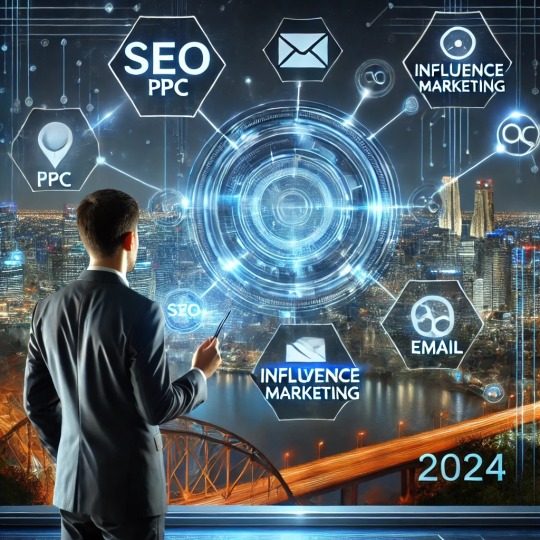
Written by Digital Cappuccino
In the always-changing field of digital marketing, differentiating oneself from competitors calls for more than just a fundamental awareness of the terrain. It requires a special mix of technology, strategy, and creativity—and a powerful online presence—often spearheaded by exceptional website design, a mix Digital Cappuccino has perfected to change companies and provide amazing outcomes in 2024. This blog shows how Digital Cappuccino, a digital marketing company transforms the digital marketing scene, emphasises its unique approach, highlights client success stories, and investigates creative strategies that make it a top option for companies looking for digital success.
The Digital Cappuccino Approach: Combining Innovation with Strategy
Digital Cappuccino distinguishes itself from other digital marketing firms by addressing every client's particular demands holistically and personally. Like a well-made cappuccino, they believe in carefully combining components to produce an outstanding outcome. This method focuses on several fundamental ideas:
Understanding the Client's Vision: Digital Cappuccino gives top priority to know the client's competitive environment, target audience, and corporate objectives. This thorough research enables them to create not just creative but also client-orientated methods that complement their general vision.
Data-Driven Decision Making: Digital Cappuccino bases its strategy on facts even if creativity is crucial. They use analytics technologies to get an understanding of consumer behaviour, advertising success, and industry trends. This data-driven strategy guarantees that every choice is informed and maximised for the greatest effect.
Adaptability and Innovation: Digital Cappuccino takes great satisfaction in staying ahead of the evolving digital world. To retain their customer's leading edge in the sector, they are always investigating new technologies, platforms, and approaches.
Transparency and Cooperation: Digital Cappuccino feels that it should establish close, cooperative ties with its customers. They keep open lines of contact, often updating, compiling performance data, and offering chances for comments.
Digital Cappuccino: Enhancing Digital Marketing
Content management: Content is king; it's also maybe the most effective approach to interact, reach, and connect with people.
Email marketing: Email is still a rather successful marketing tool.
Social Media Marketing: SMM helps in raising awareness, strengthening the brand, producing leads and boosting conversion.
Digital Marketing Strategies: Optimising voice searches, using video marketing, account-based marketing (ABM)
Client Success Stories: Actual Results, Actual Influence
The outcomes every effective marketing firm produces for its customers define its success. With a portfolio of success stories from several sectors, Digital Cappuccino shows how able it is to change companies and generate real results.
Being a digital marketing company, Digital Cappuccino used a thorough SEO approach to assist a local e-commerce company in growing its website traffic by 150%, thereby greatly increasing online sales.
Digital Cappuccino redesigned the website and ran focused PPC campaigns for a regional service company, therefore increasing the 75% conversion rates and significantly generating leads.
For a new product launch, Digital Cappuccino created an impressive social media marketing campaign that produced a 300% rise in brand mentions and a clear boost in social media participation.
Keeping Ahead of the Curve: Original Strategies for Digital Mastery
Digital Cappuccino is dedicated to keeping creative and investigating fresh technologies and approaches to provide its customers with original ideas.
Digital Cappuccino uses artificial intelligence (AI) to automate chores, personalise marketing messages, and get a more thorough understanding of consumer behaviour.
Digital Cappuccino maximises website design and content for voice searches as voice search grows in popularity so that its customers are seen in voice search results.
Digital Cappuccino produces interesting video material that grabs viewers, properly conveys brand messages, and generates conversions.
Digital Cappuccino uses account-based marketing (ABM) techniques to target high-value accounts with customised marketing campaigns, therefore generating more revenues and closer customer connections.
Why Opt for Digital Cappuccino
Among the many Digital marketing companies available, Digital Cappuccino is one of the reliable, creative, results-orientated partners for companies of all kinds. Beyond just understanding marketing, Digital Cappuccino understands how crucial website design is in creating a positive first impression and raising conversions. With its unique blend of strategy, creativity, and technology, Digital Cappuccino helps businesses reach incredible results and prosper in the digital age. Look no further than Digital Cappuccino if you're looking for a digital marketing agency equipped to transform your business and enable your best possible performance.
Get in touch with Digital Cappuccino right now to find out how our digital marketing plans could enable your business to stand out and flourish.
#Digital Marketing Company in Gurugram#Digital Marketing Agency#BusinessGrowth#MarketingStrategy#SocialMediaMarketing
0 notes
Text
What Is the Most Effective B2B Lead Generation Strategy for Your Business?
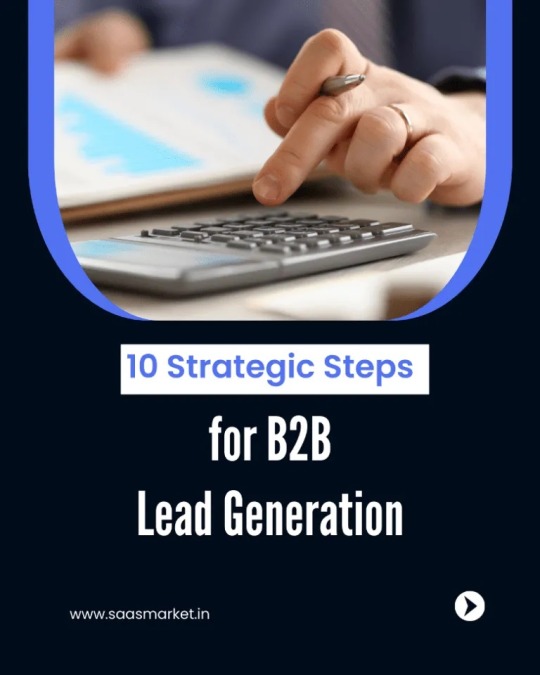
B2B lead generation strateg
The most effective B2B lead generation strategy depends on your industry, target audience, and resources, but here are some proven strategies that work across various sectors:
1. Content Marketing & SEO
High-quality content (blogs, whitepapers, case studies) attracts inbound leads.
SEO optimization ensures your content ranks high on search engines.
Lead magnets (e.g., eBooks, webinars) help capture contact details.
2. LinkedIn Outreach & Networking
Personalized LinkedIn messages build relationships with decision-makers.
LinkedIn Ads and Sales Navigator help target the right audience.
Thought leadership (posting insights, engaging in discussions) increases credibility.
3. Email Marketing & Nurturing Campaigns
Cold email outreach with a personalized approach generates new leads.
Drip email campaigns nurture potential leads over time.
Marketing automation tools (HubSpot, Mailchimp) improve engagement.
4. Webinars & Virtual Events
Hosting webinars positions your business as an industry expert.
Collaborating with influencers or industry experts increases attendance.
Interactive Q&A sessions create engagement and lead conversions.
5. Paid Advertising (PPC & Social Ads)
Google Ads captures high-intent leads searching for solutions.
LinkedIn & Facebook Ads target specific business roles and industries.
Retargeting ads keep your brand in front of potential leads.
6. Referral & Partnership Programs
Encourage satisfied customers to refer new clients.
Strategic partnerships with complementary businesses expand your reach.
Incentivized programs (discounts, commissions) motivate referrals.
7. Account-Based Marketing (ABM)
Identify high-value accounts and tailor marketing efforts to their needs.
Personalized outreach through targeted content and direct engagement.
Multi-channel approach (email, LinkedIn, retargeting ads) increases effectiveness.
8. Cold Calling & Sales Outreach
Warm up leads with prior engagement (emails, LinkedIn).
Use sales scripts that focus on solving pain points.
CRM integration (HubSpot, Salesforce) streamlines follow-ups.
9. Lead Generation Tools & Automation
CRM systems manage leads effectively.
Chatbots & AI-driven tools engage website visitors in real time.
Lead scoring helps prioritize the most valuable prospects.
10. Industry Events & Trade Shows
Speaking at events establishes thought leadership.
Networking opportunities generate warm leads.
Booth presence & demos create direct engagement.
Choosing the Right Strategy
For high-ticket B2B sales? ABM, LinkedIn outreach, and content marketing work best.
For SaaS or digital products? SEO, PPC, and email automation are effective.
For professional services? Referrals, LinkedIn networking, and webinars are key.
1 note
·
View note
Text
Intelligent Lead Routing: The Key to Successful Account-Based Marketing
For a successful account-based marketing (ABM) strategy, businesses need an advanced lead routing system that ensures every lead is matched to the right account and sales rep. Without this, leads may get lost, sales cycles become slow, and customer experience suffers.
The Role of Lead Routing Software
An advanced lead routing platform automates record assignment by:
Matching leads with existing accounts using AI-powered algorithms.
Assigning leads to entire account teams instead of a single sales rep.
Prioritizing leads based on ICP (Ideal Customer Profile) scoring.
Benefits of an Automated Lead Routing System
By integrating lead routing software into your CRM, businesses can:
Improve alignment between marketing and sales teams.
Reduce friction in the lead management process.
Deliver a seamless customer experience that increases conversion rates.
A well-implemented account-based lead routing strategy, supported by intelligent software, drives revenue growth and ensures that no hot lead falls through the cracks.
0 notes
Text
The Ultimate Guide to SaaS Lead Generation
Understanding SaaS Lead Generation
Generating high-quality leads is essential for Software-as-a-Service companies looking to scale. A strong saas lead generation strategy ensures a consistent pipeline of potential customers who are actively seeking solutions. By implementing targeted outreach, content marketing, and data-driven prospecting, SaaS companies can optimize their lead generation process and improve conversion rates.
The Power of B2B SaaS Lead Generation
B2B companies operate in a highly competitive space, making it critical to have a well-defined strategy. B2B saas lead generation focuses on attracting businesses that require cloud-based solutions to improve efficiency and performance. Leveraging intent-based marketing, inbound campaigns, and strategic email outreach helps SaaS firms connect with key decision-makers and secure long-term clients.
Maximizing B2B Lead Generation for SaaS
The effectiveness of B2B lead generation for saas lies in its ability to target niche audiences. Unlike traditional marketing, SaaS lead generation relies on a mix of automation, AI-driven analytics, and personalized engagement to convert prospects into customers. Identifying the right accounts and delivering tailored messaging can significantly enhance the success of SaaS sales funnels.
The Benefits of Outsourced Sales Development for SaaS
Managing an internal sales team requires significant resources. Choosing outsourced sales development for saas allows companies to leverage expert SDRs who specialize in prospecting, qualification, and appointment setting. This approach helps SaaS businesses save time and money while focusing on closing deals rather than sourcing leads.
Enhancing Growth with SaaS Lead Generation Services
SaaS companies must use data-driven strategies to identify and engage their target audience effectively. Utilizing saas lead generation services ensures access to industry-specific expertise, advanced analytics, and multi-channel outreach. From content-driven inbound marketing to outbound prospecting, these services help SaaS companies maintain a steady flow of qualified leads and improve conversion rates.
Key Factors for SaaS Lead Generation Success
Account-Based Marketing (ABM) – Targeting high-value accounts increases conversion potential.
Personalized Outreach – Custom messages tailored to pain points drive higher engagement.
SEO and Content Strategy – Quality content attracts organic traffic and generates inbound leads.
Automated Email Sequences – Nurturing leads through well-timed follow-ups improves retention.
Data-Driven Decisions – Leveraging insights from analytics ensures continuous optimization.
A strong SaaS lead generation strategy is essential for long-term growth. By combining targeted marketing techniques, outsourcing sales development, and leveraging lead generation services, SaaS companies can achieve sustainable success in a competitive market.
0 notes
Text

Step-by-Step Guide to Create the Perfect ABM Campaign in 2025
In 2025, Account-Based Marketing (ABM) remains a game-changer for B2B sales, offering hyper-targeted strategies to engage high-value accounts. Follow this step-by-step guide to build a winning ABM campaign:
1. Identify High-Value Accounts
Use AI-driven intent data and CRM insights to pinpoint accounts with the highest revenue potential. Align with sales teams to refine your Ideal Customer Profile (ICP).
2. Build Account Personas
Deep-dive into decision-makers’ pain points, challenges, and buying behavior. Leverage LinkedIn and marketing automation tools to create personalized engagement strategies.
3. Craft Hyper-Personalized Content
Develop tailored content, including case studies, whitepapers, and personalized video messages, to address specific pain points. Use AI-driven content recommendations to optimize messaging.
4. Leverage Multi-Channel Engagement
Integrate LinkedIn Ads, email marketing, and personalized website experiences to engage decision-makers. AI-powered chatbots can further personalize interactions in real-time.
5. Align Marketing & Sales
Ensure sales and marketing teams collaborate through shared goals and insights. Use CRM and ABM platforms like Terminus or Demandbase to track engagement.
6. Measure & Optimize
Track key metrics like account engagement, pipeline velocity, and deal conversions. Use analytics to refine targeting and improve campaign performance continuously.
Final Thoughts
A data-driven, personalized ABM strategy is the key to B2B sales success in 2025. By aligning sales and marketing, leveraging AI, and optimizing engagement, you can convert high-value accounts faster than ever.
Ready to scale your ABM efforts? Start today! 🚀
0 notes
Text
Reimagining How We Talk to Technology: Voice Assistant Bots and Generative AI
Keeping up with all the communication tasks in a busy business can be tough. That’s where our Voice Assistant Bots at VoiceOwl.ai can help. We’ve designed these bots to take the load off your team by automating key processes, so they can focus on what really matters—growing your business and boosting sales.
Imagine your sales reps spending their time only on leads that are ready to convert, while our Voice Assistant Bots handle the rest. They can verify, qualify, and nurture leads, making sure your team is always talking to the right people at the right time. This doesn’t just save time—it helps you have 10 times more meaningful conversations, which can seriously boost your sales.
And it doesn’t stop there. Our Voice Assistant Bots can also scale up your sales, pre-sales, and even debt collection calls. By automating these tasks, you reduce the manual work, cut costs by up to 60%, and let your team focus on the bigger picture—like building strong customer relationships and closing more deals.
With VoiceOwl.ai, you’re not just getting a tool—you’re getting a smarter way to communicate. Let our Voice Assistant Bots handle the repetitive stuff, so your team can do what they do best: grow your business.
#Lead verification automation#Lead Qualification automation#BFSI Automation#NBFC Automation#ABM Marketing Automation#Call Center Automation#Conversational AI#RCM Automation#E-commerce Automation#Logistics Automation#Recruitment Automation
0 notes
Text
12 B2B SaaS Growth Marketing Agency Strategies in 2025
Intro
As the SaaS industry continues to flourish, businesses are facing increasing competition. In 2025, achieving sustainable growth for B2B SaaS companies requires innovative marketing strategies tailored to the evolving landscape. Below, we explore 12 actionable growth marketing strategies for B2B SaaS agencies that can make a difference in your results. For a deeper dive into these strategies, check out our detailed guide here.
1. Leverage Data-Driven Marketing
Data is at the core of effective marketing. Use advanced analytics tools to track customer behavior, optimize campaigns, and measure ROI. By understanding data patterns, you can personalize campaigns and focus on high-converting channels.
2. Emphasize Account-Based Marketing (ABM)
ABM focuses on targeting high-value accounts with personalized campaigns. Create customized content for key decision-makers in target businesses, aligning sales and marketing efforts to boost conversions.
3. Utilize AI and Automation
Artificial intelligence and automation tools streamline repetitive tasks, improve lead scoring, and enhance customer segmentation. Chatbots, predictive analytics, and automated email sequences are essential tools for scaling your marketing efforts efficiently.
4. Create High-Value Content
Position your brand as a thought leader by creating in-depth guides, whitepapers, and webinars. Ensure your content is SEO-optimized and addresses pain points specific to your target audience.
5. Optimize for Search Engines
SEO remains crucial in 2025. Perform keyword research to identify terms your audience searches for and create content that ranks for those queries. Technical SEO, such as page speed and mobile optimization, is equally vital.
6. Focus on Customer Retention
Acquiring new customers is important, but retaining them is equally critical. Offer loyalty programs, proactive customer support, and regular updates to keep existing clients satisfied and engaged.
7. Harness Social Proof
Leverage customer testimonials, case studies, and reviews to build trust with potential clients. Highlight measurable results that your SaaS solution has delivered for other businesses.
8. Invest in Video Marketing
Video continues to dominate online engagement. Create explainer videos, tutorials, and testimonials to showcase your SaaS product’s benefits. Use platforms like YouTube, LinkedIn, and your website for distribution.
9. Develop Strategic Partnerships
Collaborate with complementary businesses to reach new audiences. Joint webinars, co-branded content, or affiliate partnerships can expand your visibility and generate quality leads.
10. Optimize the Free Trial Experience
Ensure your free trial or freemium model highlights the key features of your product. Use onboarding emails, in-app tutorials, and support to help users experience the full value of your SaaS solution.
11. Leverage Paid Advertising Wisely
Invest in paid channels like Google Ads, LinkedIn Ads, and programmatic advertising. Target specific industries, roles, or company sizes to ensure your ad budget generates qualified leads.
12. Analyze and Adapt Continuously
The SaaS landscape evolves rapidly. Regularly analyze your campaigns’ performance and adapt your strategies to stay ahead of competitors. Use A/B testing to optimize landing pages, emails, and ads for better results.
For more insights and actionable tips on growing your B2B SaaS company, read our complete guide: 12 B2B SaaS Growth Marketing Agency Strategies. These strategies, when implemented effectively, can set your business apart and drive sustainable growth in 2025.
0 notes
Text
Accelerate your Business Growth with these Insider Secrets

In today's dynamic and fast-paced business landscape, finding the keys to accelerate business growth is paramount. Let's uncover some insider secrets that will power your journey towards business expansion and success.
DOWNLOAD THE INSIDER SECRETS INFOGRAPHC HERE
Embrace Market Trends and Emerging Markets
One of the critical aspects of accelerating business growth is staying in tune with market trends and emerging markets. Recognize the industry trends early, adapt, and align your business strategy accordingly. This proactive approach will position your business at the forefront of innovation and keep you ahead of the competition.
Foster a Customer-centric Culture
In the realm of B2B and B2C businesses, the customer is king. Develop a customer-centric culture, prioritizing their needs and preferences. Feedback systems, customer satisfaction surveys, and personal engagement are excellent ways to cultivate and nurture this approach, fostering loyalty and customer retention.
Harness the Power of Data Analysis
In the era of Big Data, understanding and leveraging data analysis can be a game-changer. Use data to identify sales opportunities, understand your customer behavior, enhance product development, or optimize marketing strategy. Data-driven decision-making can lead to greater efficiency and profitability, ultimately accelerating your business growth.
Implement CRM Integration
A robust Customer Relationship Management (CRM) system can streamline your sales pipeline and enhance your marketing efforts. By integrating CRM into your business processes, you can efficiently manage customer data, improve communication, increase customer satisfaction, and drive sales.
Explore Account-Based Marketing
Account-Based Marketing (ABM) is a highly targeted strategy that focuses on high-value accounts that are most likely to convert. This marketing approach can result in higher ROI compared to traditional methods. Incorporate ABM into your marketing strategy to maximize marketing resources and accelerate growth.
youtube
Utilize Technology and Automation
Automation can streamline business processes, reduce manual tasks, increase accuracy, and free up time for strategic planning. From automating email marketing campaigns to employing AI for customer service, technology can play a significant role in accelerating business growth.
Develop a Growth-Oriented Mindset
Lastly, cultivating a growth-oriented mindset within your team is crucial. Foster an environment that encourages innovation, risk-taking, and continuous learning. Empower your employees to become change agents in your organization, driving growth from within.
Establish Strategic Partnerships
Strategic partnerships can unlock new opportunities for business expansion. By aligning with the right partners, you can gain access to new markets, enhance your product or service offerings, and accelerate your business growth.
To wrap it up, accelerating your business growth is a multifaceted process. It requires keen insight into market trends, a customer-centric approach, effective utilization of data and technology, and an innovative mindset. By incorporating these insider secrets into your business strategy, you can set your enterprise on a fast track to success.
#B2B#LeadGeneration#Sales#BusinessGrowth#DecisionMakers#CEOs#MarketingDirectors#BusinessOwners#BusinessAdvisors#Recruiters#BusinessTips#BusinessStrategy#Entrepreneurship#Youtube
7 notes
·
View notes
Text
How Technographic Data Transforms B2B Marketing and Sales?
Technographic data is revolutionizing sales and marketing strategies by providing deep insights into a company's technology stack. In today's competitive landscape, understanding your target audience requires more than just firmographic and demographic data. To create highly targeted marketing campaigns and personalized outreach, businesses must leverage technographic insights—detailed data on the software, tools, and infrastructure their prospects use. By analyzing a company’s tech stack, businesses can identify high-intent prospects, refine messaging, and drive more effective engagement.
Technographic data enables B2B marketing teams to refine their ABM (Account-Based Marketing) strategies and create data-driven marketing campaigns that resonate with their ideal customers. By leveraging this information, businesses can gain a competitive edge, improve lead qualification, and drive higher conversion rates.
Get full insights@ https://itechseries.com/blog/technographic-data/
What is Technographic Data?
Technographic data refers to insights about the technologies, software, and tools a company uses. This includes everything from CRM systems and marketing automation platforms to cloud solutions and cybersecurity tools.
By analyzing technographic data, B2B marketers can determine which businesses are most likely to benefit from their products or services. This allows for more precise targeting and better resource allocation.

Why Technographic Data Matters in B2B Marketing
Traditional B2B marketing relies on broad segmentation, but technographic data provides granular insights into a company’s tech environment. This makes marketing efforts more strategic and efficient.
For instance, if your company provides cloud-based cybersecurity solutions, knowing which businesses currently use outdated security software can help you identify high-priority prospects. Instead of relying on generic messaging, you can craft tailored campaigns that address specific pain points.
The Role of Technographics in ABM (Account-Based Marketing)
ABM is all about precision. Instead of casting a wide net, businesses using ABM focus on high-value accounts with personalized, relevant content. Technographic data enhances this approach by ensuring that the accounts selected have a genuine need for your solution.
For example, if a company’s tech stack includes your competitor’s software, you can design a competitive displacement strategy that highlights your advantages. This allows for smarter, more effective engagement with decision-makers.
How Technographic Data Enhances Lead Scoring
Lead scoring helps marketing and sales teams prioritize leads based on their likelihood to convert. Incorporating technographic data into lead scoring models improves accuracy by identifying prospects who already use complementary technologies.
For example, if your software integrates with Salesforce, targeting companies that already use Salesforce means they are more likely to be interested in your solution. This shortens sales cycles and increases win rates.
Explore the latest marketing and tech insights@ https://itechseries.com/gtm-library/
Personalizing Data-Driven Marketing Campaigns
Personalization is key to modern B2B marketing. Technographic data allows marketers to create highly targeted content and messaging that speaks directly to a prospect’s needs.
Imagine running a LinkedIn ad campaign specifically for companies using a particular email automation tool. By aligning your messaging with their existing tech stack, you increase engagement and conversion rates significantly.
Improving Sales Outreach with Technographic Insights
Sales teams often struggle with cold outreach. However, technographic data provides valuable context that enables more meaningful conversations.
Instead of sending a generic sales pitch, your sales reps can open discussions by referencing the technologies a prospect already uses. This builds credibility and trust, making prospects more likely to engage in meaningful conversations.
Using Technographics for Competitive Intelligence
Understanding your competitors’ customer base is a powerful growth strategy. Technographic data allows you to identify companies currently using competing solutions and create targeted campaigns aimed at converting them.
For instance, if a prospect is using a competing CRM, your marketing team can highlight features and benefits that differentiate your product. By positioning your solution as an upgrade, you increase the likelihood of conversion.
The Future of Technographic Data in B2B Marketing
As B2B marketing becomes increasingly data-driven, technographic insights will continue to play a crucial role. With advancements in AI and predictive analytics, businesses will be able to anticipate buyer needs before they even arise.
Moving forward, integrating technographic data with intent data and firmographics will create even more refined targeting models. Companies that adopt data-driven marketing strategies will stay ahead of the competition and drive higher revenue growth.
Final Thoughts
Technographic data is no longer a nice-to-have—it’s a must-have for any B2B marketing strategy looking to improve targeting, enhance ABM strategies, and drive higher conversions. By understanding the technologies your prospects use, you can deliver more personalized, impactful marketing campaigns that result in faster sales cycles and stronger customer relationships. For businesses looking to leverage technographic insights, now is the time to start. Whether you’re refining your lead generation strategy, optimizing sales outreach, or building a data-driven B2B marketing approach, technographic data will be the key to B2B success.
0 notes
Text
6 Must-Know B2B SaaS Marketing Trends for 2025

As the B2B SaaS landscape evolves, companies face both challenges and opportunities in achieving sustainable growth. The rise of customer expectations, stiff competition, and a highly saturated & expensive digital advertising ecosystem necessitate a rethinking of marketing strategies. In the following article, we have articulated key marketing trends shaping the B2B SaaS industry in 2025.
Focus On Customer Retention
Customer retention is critical to driving revenue and profitability in SaaS. To minimize churn and enhance product engagement, marketing teams must develop targeted retention campaigns. One effective approach is implementing loyalty programs, which can take the form of:
Priority Support Based on Product Usage: Offering tiered support, where high-usage customers receive priority service. This not only enhances their experience but also reinforces their value to the company.
Discounts on Purchase of Additional Modules: Offering attractive discounts on add-on modules and complimentary products. This strategy increases revenue while deepening customer engagement.
Recognition at Customer Events: Highlighting loyal customers at user conferences or webinars. Recognized customers often become brand advocates, sharing their positive experiences with others.
Early Access to Product Updates and Upgrades: Giving long-term customers a first look at new features or products. This exclusive access makes customers feel valued and fosters engagement with the platform.
2. AI-Powered Marketing Tools and Automation
Artificial Intelligence (AI) is revolutionizing B2B SaaS marketing by streamlining processes and enhancing personalization. Key applications of AI in marketing can include:
Building Prospect Data: AI-powered tools like Apollo have transformed the way SaaS companies build prospect data. By analyzing buyer intent, these tools can identify prospects with high potential, and segment them effectively. Marketing teams can target these segments through tailored campaigns, streamlining efforts, and maximizing impact.
Crafting Compelling Messaging: AI-powered platforms can analyze audience preferences and behaviours to generate highly personalized and persuasive email content, increasing engagement and response rates.
Creating Pitch Videos and Demo Scripts: AI enables marketing teams to produce professional-quality pitch videos and scripts for webinars quickly, significantly reducing the cost of production and time to launch these marketing assets.
3. Expansion of Account-Based Marketing (ABM)
In 2025, Account-Based Marketing (ABM) should become a primary focus for B2B SaaS companies aiming to deliver highly personalized outreach. As digital ads and social media channels become increasingly expensive and saturated, ABM offers a more targeted and cost-effective approach. ABM enables marketing teams to tailor their messaging to specific industries, use cases, and target audiences ensuring higher engagement. ABM approach can include:
Combining Email Marketing with Re-Targeting Ads: By integrating personalized email campaigns with re-targeting ads, SaaS companies can keep their brand top-of-mind for key accounts across multiple touch-points.
Innovative Direct Mail Campaigns: Sending carefully curated snail mail letters to high-value accounts can add a personal touch, breaking through the digital clutter and creating a lasting impression.
ABM’s ability to focus resources on the most valuable accounts ensures effective outreach. With proven potential to deliver strong ROI, ABM is a must-adopt strategy for SaaS companies in 2025
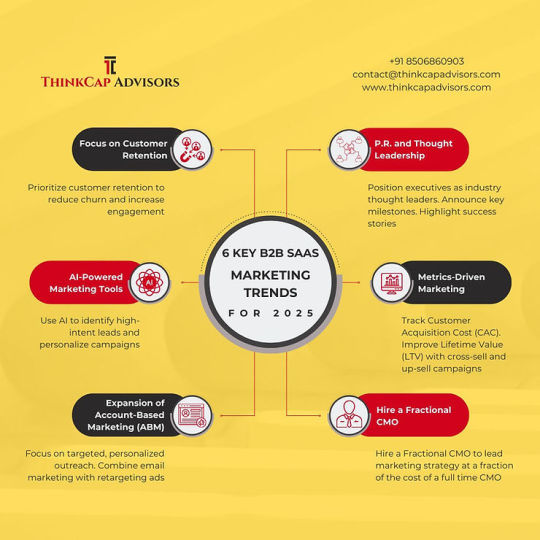
4. Focus on P.R. and Thought Leadership
Public Relations (P.R.) is re-emerging as a vital marketing channel for B2B SaaS companies. A well-crafted P.R. strategy can amplify brand visibility and position key executives as thought leaders in the industry.
Positioning Key Executives: P.R. efforts can include publishing articles, securing interviews, and leveraging byline opportunities to showcase executive expertise and establish credibility.
Announcing Major Milestones: P.R. can be the vehicle for communicating product launches, strategic alliances, and significant customer wins, ensuring these milestones reach the right audience.
Driving Brand Advocacy: P.R. firms can identify opportunities for customers to participate in stories and events, creating a platform for advocacy. These engagements help build trust and highlight real-world success stories.
As a marketing consulting firm specializing in B2B SaaS, we believe that by leveraging public relations effectively, SaaS companies can create a strong narrative, enhance brand reputation, and foster deeper connections with their target market.
5. Metrics-Driven Marketing
As B2B SaaS companies continue to grow their customer base, it is important to track customer acquisition costs. Companies must:
Map Customer Acquisition Cost (CAC): Mapping CAC to specific marketing channels helps identify which channels deliver the best ROI. By understanding channel performance, companies can prioritize budget allocation to the most effective channels.
Calculating Lifetime Value (LTV): By analyzing customer data, including industry type, usage patterns, and purchase behaviour over time, SaaS companies can accurately determine the lifetime value (LTV) of their customers. This analysis enables businesses to segment new customers based on similar profiles and craft targeted cross-sell and up-sell programs to improve revenue per customer.
6. Hire a Fractional CMO
A fractional CMO can be a transformative asset for B2B SaaS companies. By offering strategic leadership, mentoring in-house teams, and applying their cross-industry expertise, Fractional CMOs drive exceptional outcomes. Leveraging an extensive network of marketing service providers and agencies, they can deliver comprehensive solutions tailored to business needs—all at a fraction of the cost of hiring a full-time CMO.
Conclusion
As a marketing consulting services firm specializing in B2B SaaS, we believe that in 2025, companies must embrace an omni-channel marketing strategy that seamlessly integrates offline and online channels. Additionally, businesses need to move beyond the conventional notion that customer retention is solely the responsibility of the customer success team. Marketing must take an active role in retention by launching targeted campaigns that drive customer advocacy and enhance lifetime value (LTV).
#marketing consulting services#fractional cmo services#marketing consulting firm#P.R. strategy#Account-Based Marketing (ABM)
0 notes
Text
Why Your Business Needs a Lead-to-Account Matching Solution
In B2B sales, success depends on speed, accuracy, and efficiency. Yet, many businesses still struggle with manually matching leads to accounts, leading to misrouted leads, delayed responses, and missed opportunities. A lead-to-account matching solution eliminates these problems, ensuring that leads are instantly assigned to the correct accounts, improving sales performance and increasing revenue.
The Problem with Manual Lead Matching
Manual lead matching is time-consuming, error-prone, and inefficient. Here’s why it’s holding businesses back:
Delayed Lead Response – Sales reps waste time manually verifying and assigning leads, reducing response times and engagement rates.
Mismatched Leads – Leads often end up assigned to the wrong accounts, causing confusion and lost sales opportunities.
Inconsistent CRM Data – Duplicate and misclassified leads clutter the CRM, making reporting and analytics inaccurate.
Sales and Marketing Misalignment – Poor lead-to-account matching disrupts Account-Based Marketing (ABM) strategies, leading to wasted marketing spend and lower ROI.
How a Lead-to-Account Matching Tool Solves These Issues
A lead to account matching tool automates the process, ensuring that leads are routed correctly and efficiently. Here’s how it transforms B2B sales:
Instant Lead Assignment – AI-driven automation ensures that leads are matched and assigned in real time, reducing delays.
Higher Conversion Rates – Faster response times mean a greater chance of turning leads into customers.
Cleaner CRM Data – Automated lead matching prevents duplicate records and maintains data accuracy.
Stronger ABM Strategies – Ensuring that the right leads are assigned to the right accounts helps marketing and sales teams work in sync.
Future-Proof Your Sales with Automation
The competition in B2B sales is fierce, and companies that rely on outdated manual processes risk losing valuable leads. A lead to account matching solution ensures every lead is handled efficiently, increasing sales productivity and revenue growth.
Don’t let slow, inefficient lead management hold your business back. Automate your lead-to-account matching today and unlock your full sales potential! 🚀
0 notes